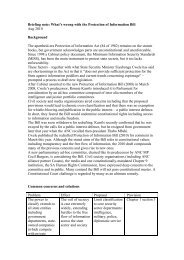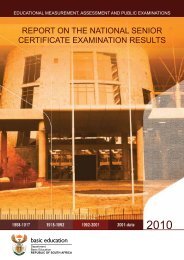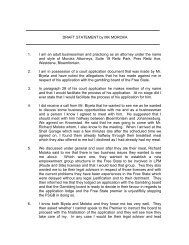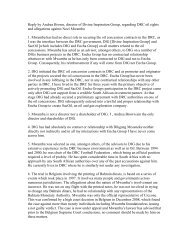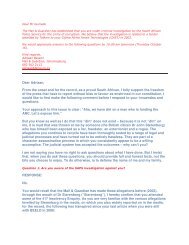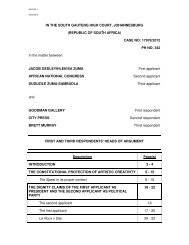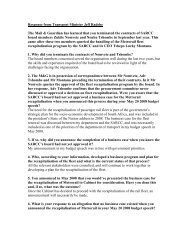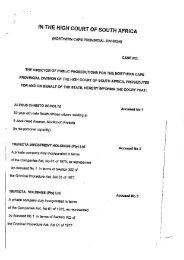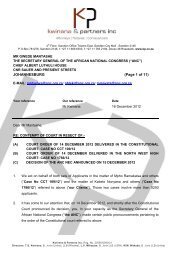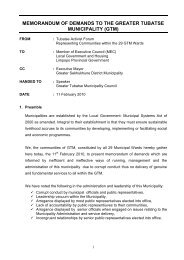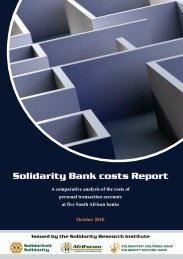intelligence in a constitutional democracy final report to the ... - Mg
intelligence in a constitutional democracy final report to the ... - Mg
intelligence in a constitutional democracy final report to the ... - Mg
Create successful ePaper yourself
Turn your PDF publications into a flip-book with our unique Google optimized e-Paper software.
Chapter 2: Key Pr<strong>in</strong>ciples and Perspectives on Security and Intelligence<br />
The ma<strong>in</strong> functions of <strong><strong>in</strong>telligence</strong> services are <strong>to</strong> predict, detect and analyse<br />
<strong>in</strong>ternal and external threats <strong>to</strong> security and <strong>to</strong> <strong>in</strong>form and advise <strong>the</strong><br />
Executive about <strong>the</strong> nature and causes of <strong>the</strong>se threats. The services are<br />
<strong>the</strong>reby expected <strong>to</strong> contribute <strong>to</strong> prevent<strong>in</strong>g, conta<strong>in</strong><strong>in</strong>g and overcom<strong>in</strong>g<br />
serious threats <strong>to</strong> <strong>the</strong> country and its people.<br />
In order <strong>to</strong> fulfil <strong>the</strong>ir vital functions, <strong><strong>in</strong>telligence</strong> services throughout <strong>the</strong> world<br />
are able <strong>to</strong> operate secretly and have special powers <strong>to</strong> acquire confidential<br />
<strong>in</strong>formation through surveillance, <strong>in</strong>filtration of organisations, <strong>in</strong>terception of<br />
communication and o<strong>the</strong>r methods that <strong>in</strong>fr<strong>in</strong>ge <strong>the</strong> rights <strong>to</strong> privacy and<br />
dignity.<br />
Politicians and <strong><strong>in</strong>telligence</strong> officers can abuse <strong>the</strong>se powers <strong>to</strong> <strong>in</strong>fr<strong>in</strong>ge rights<br />
without good cause, <strong>in</strong>terfere <strong>in</strong> lawful politics and favour or prejudice a<br />
political party or leader, <strong>the</strong>reby subvert<strong>in</strong>g <strong>democracy</strong>. They can <strong>in</strong>timidate<br />
<strong>the</strong> government’s opponents, create a climate of fear and manipulate<br />
<strong><strong>in</strong>telligence</strong> <strong>in</strong> order <strong>to</strong> <strong>in</strong>fluence state decision-mak<strong>in</strong>g and public op<strong>in</strong>ion.<br />
Given <strong>the</strong>se dangers, democratic societies are confronted by <strong>the</strong> challenge of<br />
construct<strong>in</strong>g rules, controls and o<strong>the</strong>r safeguards that prevent misconduct by<br />
<strong>the</strong> <strong><strong>in</strong>telligence</strong> services without restrict<strong>in</strong>g <strong>the</strong> services <strong>to</strong> such an extent that<br />
<strong>the</strong>y are unable <strong>to</strong> fulfil <strong>the</strong>ir duties. In short, <strong>the</strong> challenge is <strong>to</strong> ensure that<br />
<strong>the</strong> <strong><strong>in</strong>telligence</strong> agencies pursue a legitimate mandate <strong>in</strong> a legitimate manner.<br />
This challenge lies at <strong>the</strong> heart of our terms of reference. We have addressed<br />
<strong>the</strong> challenge and conducted <strong>the</strong> review through <strong>the</strong> lens of <strong>the</strong> Constitution.<br />
The Constitution is our legal and ethical framework because it is <strong>the</strong> supreme<br />
law and lays “<strong>the</strong> foundation for a democratic and open society <strong>in</strong> which<br />
government is based on <strong>the</strong> will of <strong>the</strong> people and every citizen is equally<br />
protected by law”.<br />
Notwithstand<strong>in</strong>g <strong>the</strong>ir grave responsibilities and <strong>the</strong> perils <strong>the</strong>y might have <strong>to</strong><br />
face, <strong>the</strong> <strong><strong>in</strong>telligence</strong> agencies and o<strong>the</strong>r security services are at all times and<br />
<strong>in</strong> all respects bound by <strong>the</strong> Constitution. The Constitution states that <strong>the</strong><br />
security services must act, and must teach and require <strong>the</strong>ir members <strong>to</strong> act,<br />
<strong>in</strong> accordance with <strong>the</strong> Constitution and <strong>the</strong> law; that national security must be<br />
pursued <strong>in</strong> compliance with <strong>the</strong> law, <strong>in</strong>clud<strong>in</strong>g <strong>in</strong>ternational law; and that no<br />
member of any security service may obey a manifestly illegal order.<br />
The Bill of Rights enshr<strong>in</strong>es <strong>the</strong> rights of all people <strong>in</strong> our country and affirms<br />
<strong>the</strong> democratic values of human dignity, equality and freedom. It b<strong>in</strong>ds <strong>the</strong><br />
legislature, <strong>the</strong> Executive, <strong>the</strong> judiciary and organs of state. The <strong><strong>in</strong>telligence</strong><br />
services are obliged <strong>to</strong> respect <strong>constitutional</strong> rights and may not <strong>in</strong>fr<strong>in</strong>ge <strong>the</strong>se<br />
rights o<strong>the</strong>r than as permitted by <strong>the</strong> Constitution and legislation.<br />
The Constitution <strong>in</strong>sists that <strong>the</strong> security services may not prejudice a political<br />
party <strong>in</strong>terest that is legitimate <strong>in</strong> terms of <strong>the</strong> Constitution or fur<strong>the</strong>r, <strong>in</strong> a<br />
10



